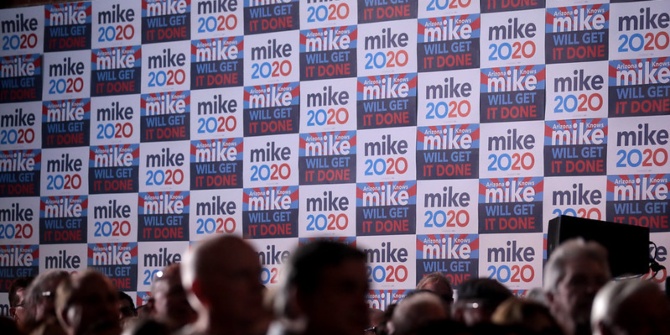 Last week Ann Ravel stepped down from the Federal Election Commission (FEC), issuing a blistering report against the Commission detailing how deadlock and changes to campaign finance law have significantly decreased its effectiveness. Melissa Smith writes that, with the remaining five commissioners serving an expired term, President Trump now has the opportunity to replace them with members who prefer less regulation. However, so far, Trump has shown little interest in the FEC, despite its finding that his presidential election campaign skirted the law.
Last week Ann Ravel stepped down from the Federal Election Commission (FEC), issuing a blistering report against the Commission detailing how deadlock and changes to campaign finance law have significantly decreased its effectiveness. Melissa Smith writes that, with the remaining five commissioners serving an expired term, President Trump now has the opportunity to replace them with members who prefer less regulation. However, so far, Trump has shown little interest in the FEC, despite its finding that his presidential election campaign skirted the law.
It is no surprise that Ann Ravel has stepped down from her seat on the Federal Election Commission. The former Chair had been unhappy for months, and there are reports she even stopped attending meetings, and had been literally phoning in her participation.
What is more surprising is the relative lack of interest in what opportunities this might provide for President Donald Trump, who has been the target of recent FEC scrutiny. In January the commission sent Trump a long and detailed letter outlining alleged campaign finance violations that include receiving presidential campaign contributions above the legal limits and taking anonymous donations.
An investigation into the Trump financial filings by the Center for Responsive Politics found thousands of dollars in campaign contributions that were donated by people listed with names such as “Mr. Anonymous” and “Mr. Refused.” The official amount that could be contributed to a federal candidate’s campaign in the 2016 election was $2,700, but Trump had many that exceeded that number.
It is not unusual for a campaign to have to return money that goes beyond federal donation limits. For instance, Bernie Sanders was blasted by the FEC in early 2016 for 1,500 questionable donations to his presidential campaign. The commission outlined its findings in a 600-page report that found at least two people gave more than $10,000 each to Sanders and actor Shia LaBeouf gave more than $6,000. Some of the questionable donations were only a few dollars over the $2,700 limit, while others were hundreds over.
Other candidates who have struggled with this issue include Ted Cruz, Ben Carson, and Barack Obama. The traditional way to deal with overzealous givers is to return the overage amount. So, say a supporter gives a candidate’s campaign $4,000. Because that is $1,300 over the federal limit, that amount would need to be refunded to that particular donor.
Sounds simple, doesn’t it? Except it isn’t. Most candidates don’t refund money until late in the campaign or even after an election is over. Sometimes candidates never return the overages or, in the case of President Trump, use creative accounting to make it look as if the money was refunded. The Center for Responsive Politics found that Trump’s financial campaign documents don’t record overages in the same way as other candidates, who will mark the overages with a minus sign to indicate that amount should be subtracted from a candidate’s total money raised.
But in Trump’s documents, the overages are listed with a note beside them saying “excess to be refunded.” There are no minus signs, and the amounts are not subtracted from the final tally, thereby inflating the amount of money that was donated to a candidate during a specific time period.
It’s unclear if this is a case in which those filing Trump’s disclosure materials are just unfamiliar with normal procedures or if it is an attempt to obscure the amounts raised by the campaign. Either way, it prompted a stern 256-page letter from the FEC, which requires photocopies of refund checks as proof of returned funds.
So what does this have to do with the future of the FEC? Consider this: if a candidate does not comply with the commission’s letter, the campaign faces financial penalties. However, because of the long process involved, penalties could come months or even years after an election ends.

Currently the FEC is a toothless tiger. Ravel wrote President Trump a 25-page report upon her resignation, recounting a litany of problems within the commission. She pointed out that 10 years ago the FEC levied $5.5 million in penalties. Last year it levied less than $600,000. This is partially because the commission has deadlocked on most votes, but can also be attributed to changes in financial campaign laws that have taken place within the last 10 years. So, while she might be correctly pointing out that the agency is not functioning smoothly, she might also be overlooking the impact of major court cases such as Citizens United v. FEC, SpeechNow.org v. FEC, and McCutcheon v. FEC, all of which have significantly affected the amounts of money that can be donated by individuals and organizations. The rules are often confusing, and they are subject to interpretation by the courts, which often leads to additional changes.
The FEC was created in 1975, and by law it is made up of six commissioners. According to its governing bylaws, the commissioners are appointed by the President and confirmed by the Senate. Terms are for six years each, and two seats come up for appointment every two years. By law, no more than three commissioners can be members of the same political party, and at least four votes are required for any official commission action. While this was intended to prevent partisan decisions, in the last few years it has led to gridlock as the ideological divide between political parties regarding campaign finances has become evident on the commission.
President Trump has a couple of options regarding the FEC. He can simply replace Ravel with someone who would be more likely to vote with the Republican members, but this seems unlikely, given that every remaining member of the commission is currently serving in an expired term. That means that every single member of the FEC could be replaced at the same time, giving Trump the opportunity to make a clean sweep at the commission. Although appointments must be confirmed by the Senate, it does offer Trump the possibility of stacking the commission with those who will vote more consistently in favor of less regulation — and perhaps lack the resolve to follow through on existing cases such as his.
He could also take the unusual step of appointing at least one person from another political party, such as Libertarian, to the commission. This could be justified as broadening the political scope of the commission while at the same time providing another voice favoring deregulation of campaign finances.
Given how infrequently a president is able to make a clean sweep at any organization, it seems there should be more interest in what decision President Trump might make in this situation. After all, this commission has power (at least in theory) over every single federal election and campaign. Yet, there has been limited discussion about the potential consequences of an all-new makeup on the commission.
Perhaps that is because those in Washington have become accustomed to an ineffectual FEC, and there is little concern that even a clean sweep of its members would create a substantial difference in how it operates. While letters from the commission can still create problems for campaigns, the current enforcement capability of the FEC is severely limited, and most election campaigns regard it as a nuisance, rather than a potential hazard.
One of the current Republican members of the FEC, Lee Goodman, told the New York Times that Ravel’s charges of dysfunction on the commission are “nonsensical and arbitrary.” Observers note that it is sometimes hard even for commissioners to figure out what the rules are and how they should be enforced, which is a change from the past. Simply doing the research required for potential violations is hampered by lack of personnel and resources. Open cases are taking longer to close, with the average now hovering at 675 days, which is part of the reason that candidates and their campaigns have less fear about possible fines or reprisals.
The real juggernaut at play is President Trump. Will he do a clean sweep of the agency, or even leave one seat open, thereby increasing the chances of votes favoring campaign finance deregulation?
It’s hard to know if President Trump will take a page from former president Ronald Reagan, who had a favorite saying when there was chaos that seemed to demand an action: “Don’t just do something — stand there.” So far, he doesn’t seem all that interested in what’s happening at the FEC, despite his own campaign being found to have skirted federal campaign laws. It seems unlikely that this will be a high priority for his administration, which has a lot of other irons in the fire right now. In the coming weeks we will see if Trump is interested in change at the FEC, or if he is happy with the status quo.
Featured image: Gage Skidmore (Flickr, CC-BY-SA-2.0)
Please read our comments policy before commenting.
Note: This article gives the views of the author, and not the position of USAPP – American Politics and Policy, nor the London School of Economics.
Shortened URL for this post: http://bit.ly/2lu0e1K
_________________________________
 Melissa M. Smith – Mississippi University for Women
Melissa M. Smith – Mississippi University for Women
Melissa M. Smith is an Assistant Professor in the Department of Communication at Mississippi University for Women. Her research focuses on US elections, particularly campaign finance reform. Her work has appeared in several journals, and she is the co-author of two books, Campaign Finance Reform: The Political Shell Game, and Dark Money, Super PACs, and the 2012 Election, both published by Lexington Books.






